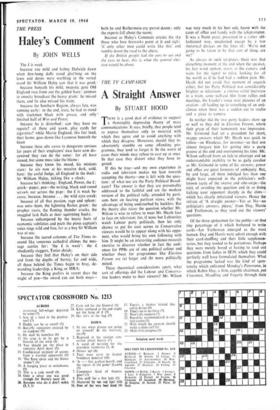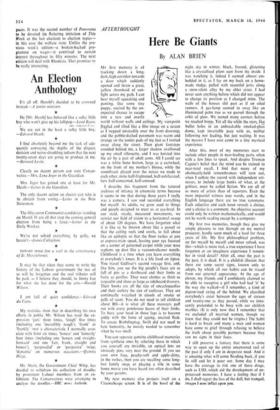THE TV CAMPAIGN
A Straight Answer
By STUART HOOD
THERE is a good deal of evidence to support a thoroughly depressing theory of mass communications. It says, briefly, that people tend to expose themselves only to material with which they agree and to avoid anything with which they disagree. Moreover, should they in- advertently stumble on some offending pro- gramme, they tend to forget it. In the worst of cases their minds may refuse to cast up at once. In that case they distort what they have in- gested.
If this be true-and my own experience in radio and television makes me lean towards accepting the theory-one is left with the ques- tion: of what use are the Party Political Broad- casts? The answer is that they are presumably addressed to the faithful and are the modern version of the political rally, attended by parti- sans bent on hearing partisan views, with the advantage of being undisturbed by hecklers. But the theory also raises the question whether Mr. Wilson is wise to refuse to meet Mr. Heath face to face on television; for, if none but Labourites watch Labour party politicals, then his only chance to put his case across to Conservative viewers would be to appear along with his oppo- nent, who would bring his own following with him. It might be an interesting audience-research exercise to discover whether in fact the audi- ences for PPBs are of one political colour and whether those for programmes like Election Forum are (a) larger and (b) more politically mixed.
These theoretical considerations apart, what sort of offerings did the Labour and Conserva- tive leaders make to their viewers? Mr. Wilson
was very much in his best suit, heavy with the cares of office and handy with the teleprompter. It was a fluent piece, presented in a rather old- fashioned way, unadorned except by a few rhetorical devices on the lines of: 'We're not going to be taken in by that sort of thing, are we?'
As always in such set-pieces, there was that disturbing moment at the end when the speaker, his last word spoken. stares at the camera and waits for the signal to relax, looking for all the world as if he had had a sudden pain. Mr. Heath did not avoid that moment of anguish either, but his Party Political was considerably brighter as television : a cinema verite interview in a train, some well-cut film from rallies and meetings, the Leader's voice over pictures of an ovation-all leading up to something of an anti- climax when there was a sudden cut to studio and a piece to camera.
In neither did the two party leaders show up as well as they did in Election Forum, where their grasp of their homework was impressive. Mr. Grimond had set a precedent for short, snappy answers which Mr. Heath was quick to follow-on Rhodesia, for instance-so that one almost forgave him for getting into a party groove at the end and overrunning his time. Mr. Wilson suffered from an itch to interrupt and an understandable inability to be as gaily cavalier as Mr. Grimond in some of his answers; power and office are great fosterers of ambiguity. But, by and large, all three indulged less than one might have expected in the politician's well- known tactic of the swerve and side-swipe--the trick of avoiding the question and in so doing kicking your opponent sharply in the shins- which has clearly infuriated viewers. Hence the refrain of 'A straight answer-Yes or No-no politician's answers, please,' from Day, Harris and Trethowan, as they read out the viewers' questions.
Of the three spokesmen for the public-or that tiny percentage of it which bothered to write cards-Ian Trethowan emerged as the most human. Day and Harris were adroit enough with• their card-shuffling and their little supplemen- taries, but they tended to be portentous. Perhaps they were merely bored at having to read out questions from ladies in SE19, which they could perfectly well have formulated themselves. What the programme lacked was the kind of spon- taneity which enlivened Monday's Panorama, in which Robin Day, a firm, capable chairman, put Crossman, Maudling and Fogarty through their paces. It was the second number of Panorama to be devoted (in flattering imitation of This Week at the last election) to election topics— in this case the welfare state. Unlike the pre- vious week's edition—a broken-backed pro- gramme on wages—it contrived to sustain interest throughout its fifty minutes. The next edition will deal with Rhodesia. That promises to be really interesting.



































 Previous page
Previous page